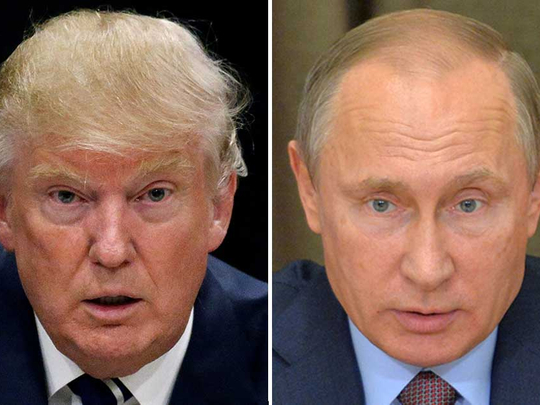
Washington: President-elect Donald Trump and Russian President Vladimir Putin agreed in a telephone conversation on Monday that relations between their countries were “unsatisfactory” and vowed to work together to improve them, the Kremlin said in a statement.
Moscow said the two men discussed combining efforts in the fight against terrorism, talked about “a settlement for the crisis in Syria” and agreed that their aides would begin working on a face-to-face meeting between them.
Trump’s office later said that Putin had called to “offer his congratulations” and that they had discussed shared threats and challenges, “strategic economic issues” and the long-term relationship between the two nations.
The president-elect spoke admiringly of Putin during the campaign, praising him as a stronger leader than President Barack Obama and saying the two countries should join together to fight terrorists, particularly Daesh in Syria.
Those views put Trump at odds with many GOP defence hawks, who have praised his promise to increase military spending but are uniformly suspicious of Moscow and have denounced Russian actions in Eastern Europe, Ukraine and Syria. The offer of cooperation could also immerse Trump in a deep controversy with the Pentagon, where military and civilian leaders have strongly opposed collaboration with Russia, particularly in Syria.
US intelligence officials have also expressed concern, noting that the Kremlin is believed to have been involved with hacking the email accounts of prominent Democrats, in hopes of injecting chaos in the US electoral process and perhaps swaying the outcome of the vote.
Trump’s conversations with Putin and other world leaders came as protests continued for a sixth straight day in major cities and on college campuses over last week’s election results.
He also faced escalating criticism over his appointment of former Breitbart News head Stephen K. Bannon as chief strategist at the White House.
Trump has signalled in numerous ways that he will not hew to many of the norms of past presidents, from declining to release his tax returns to relying on his family as key advisers. Previously, he has said he would avoid conflicts of interest as president by turning his business over to his children.
Since his victory last week, Trump has received congratulatory calls from a number of foreign leaders, including some he sharply criticised during the presidential race, such as German Chancellor Angela Merkel. On Sunday night, after he spoke with Chinese President Xi Jinping, Trump’s office said that he “believes the two leaders will have one of the strongest relationships for both countries moving forward”.
Trump’s relationship with Russia may be one of his trickiest to navigate.
Although the statement released by his office contained few details and did not mention Syria or other specific issues, it said Trump told Putin “that he is very much looking forward to having a strong and enduring relationship with Russia and the people of Russia”.
In addition to praising Putin, Trump has indicated that closer relations with Russia would keep the Kremlin from establishing tighter ties with China. He has appeared to absolve Russia from responsibility for intervention in Ukraine and the annexation of Crimea, and during the campaign repeatedly questioned the relevance of Nato, which has charged Moscow with engaging in provocative air and sea actions on the alliance’s eastern flank.
Giving Putin a free pass on those issues would run directly counter to the Russia policy of the Obama administration, which has, among other things, called for an international war-crimes investigation of Russia’s actions in Syria. It could also undermine current European negotiations with Moscow over Ukraine, as well as support for US and EU sanctions.
Russia is interested not only in getting the sanctions removed but also in obtaining equal status as a player in the Middle East and elsewhere.
Moscow is the primary supporter, along with Iran, of President Bashar Al Assad. In September 2015, one year after the United States began bombing Daesh targets in Syria, Putin ordered Russian jets into operation against “terrorist” targets there.
Most Russian air strikes, however, have targeted US-backed opposition forces fighting against Al Assad and, according to the United Nations, have killed hundreds of civilians. The United States and its European allies have called for an international investigation of Russia for war crimes.
Obama administration offers to coordinate US counterterrorism strikes against the Daesh in Syria with Russia, if the Russians would stop bombing opposition and civilian targets, but it has repeatedly failed to stop the carnage. Any cooperation with Russia would also put the United States on the side of Iran, whose activities in the region Trump has vowed to stop.












